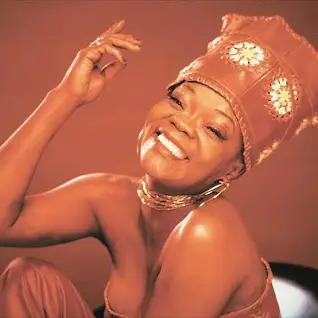
Brenda Nokuzola Fassie, born on November 3, 1964, in Langa, Cape Town, and tragically passing away on May 9, 2004, was a South African pop singer and one of the nation’s most beloved musical icons. Known as the “Queen of African Pop,” Fassie’s dynamic voice, energetic performances, and trailblazing career left an indelible mark on the South African music scene.
Raised in the townships of Cape Town, Fassie’s early exposure to music came from her mother, who was a pianist. Her remarkable vocal talent became apparent at a young age, and she joined the choir at her local church, setting the stage for a career that would redefine the landscape of South African popular music.
Fassie’s breakthrough came in the late 1970s when she joined the band Joy and became the lead singer. The group achieved success with hits like “No No No Senor” and “Weekend Special,” the latter becoming an anthem that catapulted Fassie to stardom. This marked the beginning of her solo career, and she quickly rose to prominence as one of South Africa’s most electrifying performers.
In the 1980s and 1990s, Brenda Fassie’s music dominated the airwaves, not only in South Africa but also across the continent. Her unique blend of pop, disco, and township rhythms appealed to a diverse audience, and her stage presence was magnetic. Fassie’s performances were characterized by her powerful vocals, energetic dance routines, and an unmistakable charisma that endeared her to fans.
One of her most iconic albums, “Too Late for Mama” (1989), showcased Fassie’s ability to tackle social issues through her music. The title track, a poignant ballad, addressed the devastating impact of drug addiction and its toll on families. Fassie’s willingness to engage with societal challenges through her art added depth and social relevance to her music.
Despite her musical success, Brenda Fassie’s life was marked by personal struggles, including battles with substance abuse and legal issues. Her openness about her challenges endeared her to fans, humanizing the larger-than-life persona she had become in the public eye.
In 2001, Fassie faced a health crisis that led to a coma, sparking an outpouring of concern and support from fans and the music industry. Although she survived the health scare, her career faced challenges, and she struggled to regain her former level of success.
Tragically, Brenda Fassie’s life was cut short on May 9, 2004, at the age of 39. Her death, attributed to complications from a drug overdose, shocked the nation and led to an outpouring of grief. Despite the challenges and controversies that marked her life, Fassie’s contribution to South African music remains unparalleled.
Brenda Fassie’s impact transcends her untimely death. She paved the way for future generations of female artists, challenging gender norms and breaking barriers in the male-dominated music industry. The Queen of African Pop continues to be celebrated for her musical legacy, a testament to the enduring power of her voice and the indomitable spirit that made her a cultural icon in South Africa and beyond.


Leave a Reply